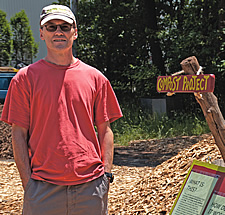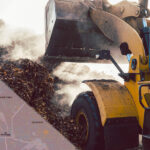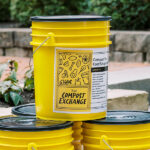
David Buckel
BioCycle 2013
On June 17, New York City Mayor Michael Bloomberg announced expanded pilot curbside collection programs for residential food waste. While that is absolutely wonderful news in many respects, many of us are finding that the discourse is evolving in unhealthy terms for community composting. Specifically, we’re hearing the message that citywide curbside pickup will kill community composting.
“Community composting” is a term for a type of composting that recycles organic material as locally as possible, and is scaled to fit a community-based environment like a neighborhood or college. It’s often known as decentralized composting, and contrasts to centralized composting that may involve collection of residential or commercial organic waste that is trucked a distance.
Community composters can increasingly reach a significant scale of materials processing. In New York City, several sites are able to manage 4 tons of food waste at a time, or over 200 tons a year, with odors and rodents controlled. They affiliate with urban farms or otherwise dedicate themselves to a neighborhood’s greening projects like school food gardens, street trees and parks. They rely on urban volunteers who enjoy outdoor manual labor that greens their community. Many volunteers get hooked on composting, the gateway drug to the broader world of recycling, because composting is one of the few volunteer jobs that gets people directly involved in creating value with recyclables. And they become vigilant about contaminants because they are picking stuff out of tons of material with their own hands.
One of New York City’s giants in recycling told me to get ready for community composting to wither after curbside pickup goes citywide. I got prickly, and the talk wasn’t pretty. What about gas-guzzling belching trucks and heavy equipment? And in contrast, what about the proof we get every day that neighborhood-based composting is a path to supporting the broader world of recycling? The debate unfolded as a matter of choosing either big or small.
That reminded me of Nixon-appointed Secretary of Agriculture Earl Butz telling farmers to “get big or get out,” creating a civil war in American agriculture between the ideas of big industrial farming and small sustainable farming. The choice to go big destroyed our soil, amongst other ills. Of the many correctives, a community of composters emerged, thriving in part on the public’s deepening commitment to sustainability. But sustainability is a demanding principle, altering the conventional rules of a market economy to take into account environmental and other costs previously ignored.
Cooperation For A Larger Goal
This demanding principle begs the question whether two groups of organics recyclers may drift apart, one day to look across a gulf to define themselves as the good guys compared to what’s on the other side. Large-scale organics recyclers build on economies of scale and grow centralized operations that can divert a huge volume of organics from landfill — the scale necessary to recover all organics. That scale of diversion helps offset the nonrenewable resources eaten and emitted by larger-scale equipment.
Community composters eliminate or minimize environmental costs of using nonrenewable resources and involve community members in the work to foster commitment to sustainable practices and reduce contaminants. That scale of diversion is undoubtedly the most sustainable, but for lack of available urban land cannot recover all organics.
We need both scales, just as we should have grown some farms large but sustained many smaller. Seventy percent of us now live in cities, and yet those cities were neither designed nor are now fit to accommodate recovering all of our organics as locally as possible. But that does not change the call of sustainability: Local as possible is still best even if there’s no choice but to centralize the rest. That means we work hard to develop as much capacity as we can on the neighborhood or community level, and then, for the remaining organics left to manage, we welcome and are grateful for key partners in organics recovery, such as environmentally responsible municipal curbside pickup programs, commercial haulers, and large-scale organics recyclers.
What about cost? In the world of sustainability, all costs count as none are hidden. Thus any big organics recycler that puts on the mantle of sustainability cannot at the same time shrug off calls for development of decentralized composting with “get big or get out.” To claim sustainability is to first help develop what is most sustainable, and then manage the rest as sustainably as we can.
What does this mean for good government and big organics recyclers? For good government, it means we develop decentralized composting as far as any city’s design will allow — meaningfully — and then meet the remaining need with centralized organics recycling. Sidestepping the hard work of building a system as sustainable as it can be merely kicks the can down the road, and later we may be talking about centralized organics recycling in terms similar to those we now use for landfills, or industrial agriculture. At least for those two “uglies” the mistakes were not committed under the name of sustainability.
For large-scale composters, Will Allen of Growing Power — dean of urban agriculture — has a solution. When asked recently at the annual USCC Conference, “What would be the one challenge you would give us today?,” Mr. Allen responded: “Give back.” Perhaps the industry-wide version of giving back could be to get in there and help figure out how to develop community composting as large as cities will allow, beginning with research and development of appropriate small-scale equipment. So maybe it’s “give big or get out.”
David Buckel, a retired attorney, serves as a consultant developing community composting sites in New York City. His largest project is at the Red Hook Community Farm in Brooklyn, which in 2012 composted 225 tons of organics in turned windrows, entirely by hand.









